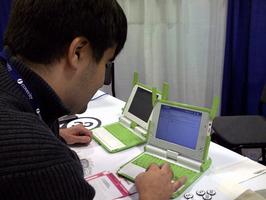August 12, 2007
LinuxWorld

This past Wednesday Luis (coworker) and I went up to SF for LinuxWorld at the Moscone Center. We didn't attend any sessions (very limited budget) but we checked out the exhibition hall and got some goodies. In addition to the normal exhibition hall stuff we got to meet and talk to Gerald Carter for a little while. He was a pretty cool guy that definitely knows his samba stuff. We also got to play with the $100 laptop and the OpenMoko. After playing with the $100 laptop for 5 minutes I can definitely say that I could not figure out how to do ANYTHING on it. Maybe using Macs have dumbed me down or something. But I did read that it is setup differently than normal (Macs, Linux, Windows) computers in that it is setup to be action driven instead of application driven. So overall I didn't find it very usable and it looked and felt a lot more like a fisher price toy than a laptop that will help kids in the developing world learn. Hopefully the kids will have better luck with it than I had. I also got to play with the OpenMoko for about 10 minutes. I was really excited to see it and use it because it is an open source mobile communications platform which means that it is an open source alternative to the iPhone. The screen resolution was pretty good, so good in fact that I had trouble reading anything on the screen because it was all too small. It had email, web, a terminal, and all that other good stuff. But I had to use a stylus to type anything (I played with the terminal extensively). I made lots of mistakes and it ran very slow. It also has 128 Mb of storage built in along with SD memory slots. Overall I think it is a piece of crap and am glad I bought an iPhone. Sure the iPhone is a "closed" system and doesn't have a terminal, SDK, or external storage, but how often would you use that stuff anyway? OK, I would use the terminal all the time if it could tunnel into my company's firewall. I think the iPhone has an edge over the OpenMoko because it plain old "just works" and easily integrates most of the stuff I want it to do. Another observation I had was that there were large booths by the big companies (Intel, Novell, IBM, etc...) staffed by marketing types giving away t-shirts and other goodies while the real open source people were in much smaller booths along the corners. The real open source people were asking for donations instead of giving things away and they looked more like my kind of people. Lastly, O'Reilly had 30 % off all books, so Luis and I browsed them before leaving. Since it was my birthday I decided to buy myself a little present, which was an O'Reilly book titled "Beautiful Code". It is basically about how great programmers think and approach problems. So far I like it.